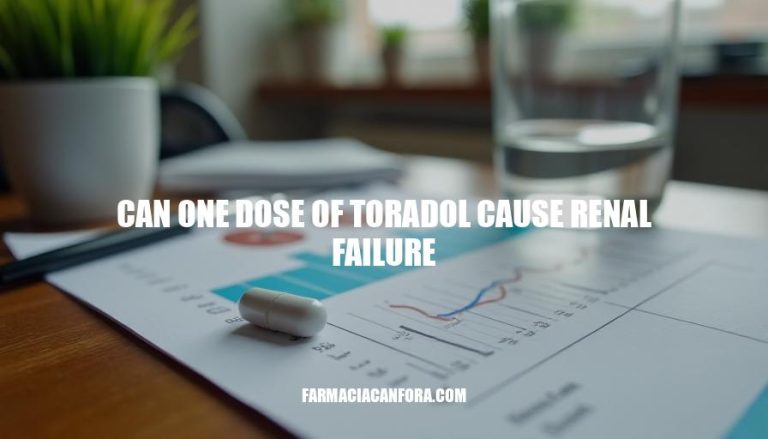


Toradol is a medicine used to help with pain. It’s often given after surgery or when you’re in a lot of pain. It works by blocking the chemicals that cause pain, inflammation, and fever.
Even though it can be very effective, Toradol can also have some risks.
One big concern is that it might hurt your kidneys. This can happen even if you only take one dose, especially if you already have kidney problems or are taking other medicines that can harm your kidneys. The medicine can affect the blood flow to your kidneys and make them work less well.
It’s essential to talk to your doctor about any concerns you might have before taking Toradol.
They can help you understand the risks and benefits and decide if it’s right for you.
Toradol (ketorolac) is a nonsteroidal anti-inflammatory drug (NSAID) that can potentially cause renal failure through several mechanisms. NSAIDs, including ketorolac, inhibit the enzyme cyclooxygenase (COX), which is responsible for the synthesis of prostaglandins. Prostaglandins play a crucial role in maintaining renal blood flow, especially in conditions of decreased renal perfusion.
By inhibiting prostaglandin synthesis, ketorolac can lead to reduced renal blood flow, resulting in acute kidney injury (AKI) or renal failure.
Evidence from studies and medical literature indicates that ketorolac can cause renal failure, particularly in patients with preexisting renal conditions or other risk factors. A study published in the Journal of Toxicology: Clinical Toxicology described a case of acute renal failure following a single intramuscular dose of ketorolac. The study highlighted the importance of prostaglandins in maintaining renal function and how their inhibition by ketorolac can lead to rapid onset of renal failure.
Another study reviewed the prescribing practices of ketorolac in an acute care hospital and found that 6.4% of patients developed AKI during treatment with ketorolac, even at average doses and short durations.
The study also noted that patients with hypertension, diabetes, or those over 65 years old were at higher risk of developing AKI.
A Q&A on iCliniq discussed the potential for a single dose of Toradol to cause acute renal failure in patients with chronic kidney disease. The response indicated that while a single dose is less likely to cause renal failure compared to prolonged use, it can still pose a risk, especially in patients with preexisting renal conditions.
:
:
:
:
1www.uptodate.com2europepmc.org3wjnu.org4www.icliniq.com
Toradol (ketorolac) is a nonsteroidal anti-inflammatory drug (NSAID) that can potentially cause renal failure through several mechanisms, including the inhibition of prostaglandin synthesis which plays a crucial role in maintaining renal blood flow. Studies have shown that ketorolac can lead to reduced renal blood flow, resulting in acute kidney injury (AKI) or renal failure, particularly in patients with preexisting renal conditions or other risk factors.
While a single dose of Toradol is less likely to cause renal failure compared to prolonged use, it can still pose a risk, especially in patients with pre-existing renal conditions. A study published in the Journal of Toxicology: Clinical Toxicology described a case of acute renal failure following a single intramuscular dose of ketorolac.
Another study reviewed the prescribing practices of ketorolac in an acute care hospital and found that 6.4% of patients developed AKI during treatment with ketorolac, even at average doses and short durations. The study also noted that patients with hypertension, diabetes, or those over 65 years old were at higher risk of developing AKI.
A Q&A on iCliniq discussed the potential for a single dose of Toradol to cause acute renal failure in patients with chronic kidney disease, indicating that while it is less likely compared to prolonged use, it can still pose a risk. Therefore, individuals should consult their healthcare professionals before using Toradol, especially if they have pre-existing kidney conditions.
In conclusion, while the risk of renal failure from a single dose of Toradol may be lower than with prolonged use, it is not negligible and can occur in patients with pre-existing kidney conditions or other risk factors. Therefore, consulting healthcare professionals before using Toradol is essential to weigh the benefits against the risks and make an informed decision.
While rare, it is possible for one dose of Toradol to cause renal failure, especially in individuals with pre-existing kidney conditions or other risk factors. It is crucial to consult a healthcare professional before using Toradol to discuss the potential risks and benefits and determine if it is suitable for your specific situation.